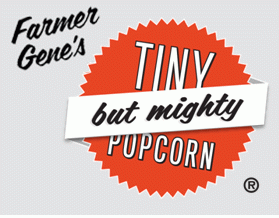My guest today is farmer and entrepreneur Gene Mealhow. Welcome to OpEdNews, Gene. You have a very interesting product that we're going to talk about today. Want to get the ball rolling for us?
Gene: Thanks for having me. We have a very different type of popcorn that is catching on all over the country. It is an heirloom, open pollinated popcorn that dates back to the early 1800s.
JB: Let's start at the beginning for all of us non-farmers. What's an heirloom popcorn? It sounds good but I don't understand exactly why.
GM: An heirloom is a plant which has been grown from its own seed for 50 years or more and never changed. These are plants which are open pollinated and you can save the seed and plant it the following year. Hybrid plants, which are a cross between two parents, will not produce the same plant in the next generation, if at all. One of the good things about TBM [Tiny But Mighty] Popcorn being an heirloom is that it is dent sterile meaning it will not cross with other corn so it can't be contaminated with GMOs [Genetically Modified Organisms]. Heirlooms are more difficult to grow but the flavor and ability to propagate each year are good things.
JB: There's lots to talk about here, Gene. As you might imagine, this suburban gal's agricultural ignorance is vast. Because the plants are open pollinated, that means that the seeds can be planted the following year? Or are those two separate facts? And what does "open pollinated" mean altogether?
GM: In open pollinated plants, the gene pool is large. Meaning that there many traits such as color, size, amount of fruit, and so on. When breeding ops [open pollinated plants], you select certain plants that carry the traits for the end plants that you want. In other words, you narrow the gene pool that produces the product from the plant that you want. The seed from ops can be propagated each year. In hybrid plants, you have two parents, a female and a male. The seeds from these parents are all the same. When planted the next year, it will not produce the same seed or plant. It reverts to the dominant parent or not at all. It's like a mule. With hybrids you get higher yield and more consistency but you can't plant the seed and get the same result the next year. These hybrid parents came from ops.
JB: Thanks, I think I've got it. I love the idea about an heirloom not being able to be contaminated by GMOs. That's a big selling point. Is that widely known among consumers?
GM:GMOs[see article below] are becoming a huge factor to many people and they're in just about everything. People around the country want to have all foods that contain GMOs to be labeled that there are GMOs in this product. Two states tried to pass legislation to make it a law. The big corporations such as Monsanto and others spent millions to successfully defeat the law. They say GMOs are totally safe. People are not convinced. Why not label them so that the package says this food contains GMOs and let people decide with their dollars if they want to buy them or not?
JB: You make a valid point. Why not, indeed? Monsanto doesn't seem overly interested in public opinion or in letting the people decide for themselves to regarding their products. But all that aside, Tiny But Mighty Popcorn has some special properties of its own. Would you care to tell us about them?
GM: The popcorn dates back to the early 1800 and the seed was kept by the Kelty family near Urbana, Iowa and passed down three generations through the eldest son of each generation. We have found no other popcorn like it so far. The plant grows only 3-4 feet tall and produces as many as 3-8 stalks per plant. Each stalk will produce 3-5 ears per stalk. Our record is 36 ears on one plant with the average being 5-12 ears per plant. The ears are only 3-4 inches long and about an inch in diameter. The seeds are smaller than conventional popcorn and have a very thin hull so when popped, it is easily digested and does not get stuck in your teeth. About one third of our customers have digestive problems but have no problem eating our popcorn.
JB: I tasted your popcorn at our farmers' market recently. I can attest that while I have no digestive problems, TBM Popcorn is quite delicious and definitely does not get stuck in your teeth - a big plus. How long have you been using this heirloom seed? And how has it been catching on?
GM: That is the other thing I forgot to mention. The small seed also has true corn taste. It is quite different than regular popcorn.
I purchased the business from the Kelty family in 1999 and moved to our farm in Shellsburg. I had been working with the seed for four years prior with the Kelty family. Once people find out about the popcorn and taste it, they are true believers and share it with others. Within the last two years, it has been catching on fast. It is sold in many stores now across the country.
(Note: You can view every article as one long page if you sign up as an Advocate Member, or higher).








